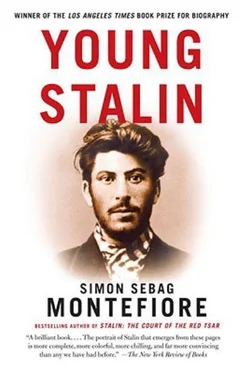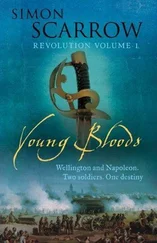“Keke didn’t have enough milk,” so her son also shared the breasts of the wives of Tsikhatatrishvili (his formal godfather) and Egnatashvili. “At first the baby didn’t accept my mother’s milk,” says Alexander Tsikhatatrishvili, “but gradually he liked it providing he covered his eyes so he couldn’t see my mother.” Sharing the milk of the Egnatashvili children made them “like milk brothers with Soso,” says Galina Djugashvili, Stalin’s granddaughter.
Soso started to speak early. He loved flowers and music, especially when Keke’s brothers Gio and Sandala played the duduki pipes. The Georgians love to sing and Stalin never lost his enjoyment of the haunting Georgian melodies. [9]In later life, he remembered hearing the “Georgian men singing on their way to market.” {26}
Beso’s little business was flourishing—he took on apprentices and as many as ten employees. One of the apprentices, Dato Gasitashvili, who loved Soso and helped bring him up, recalled Beso’s prosperity: “He lived better than anyone else of our profession. They always had butter in their house.” There were later whispers about this prosperity, embarrassing for a proletarian hero. “I’m not the son of a worker,” Stalin admitted. “My father had a shoe workshop, employing apprentices, an exploiter. We didn’t live badly.” It was during this happy time that Keke became friends with Maria and Arshak Ter-Petrossian, a wealthy Armenian military contractor, whose son Simon would become infamous as the bank robber Kamo. {27}
Keke adored her child and “in old age, I still can see his first steps, a vision that burns like a candle.” She and her mother taught him to walk by exploiting his love of flowers: Keke would hold out a camomile, and Soso ran to grasp it. When she took Soso to a wedding, he noticed a flower in the bride’s veil and grabbed it. Keke told him off but godfather Egnatashvili lovingly “kissed the child and caressed him, saying, ‘If even now you want to steal the bride, God knows what you’ll do when you’re older.’”
Soso’s survival seemed miraculous to the grateful mother. “How happy we were, how we laughed!” reminisces Keke. Her reverence must have instilled in Soso a sense of specialness: the Freudian dictum that the mother’s devotion made him feel like a conqueror was undoubtedly true. “Soselo,” as she lovingly called him, grew up super-sensitive but also displayed a masterful confidence from an early age.
Yet at the height of Beso’s success there was a shadow: his clients paid him partly in wine, which was so plentiful in Georgia that many workers received alcohol instead of cash. Furthermore, he did some business in the corner of a friend’s dukhan (tavern), which encouraged him to drink too much. Beso befriended a drinking partner, a Russian political exile named Poka, possibly a narodnik populist or a radical connected to the People’s Will, the terrorists who were at that time repeatedly attempting to assassinate Emperor Alexander II. So Stalin grew up knowing a Russian revolutionary. “My son made friends with him,” says Keke, “and Poka bought him a canary.” But the Russian was a hopeless alcoholic who lived in rags. One winter, he was found dead in the snow.
Beso found he “could not stop drinking. A good family man was destroyed,” declares Keke. The booze started to ruin the business: “His hands began shaking and he couldn’t sew shoes. The business was only kept going by his apprentices.”
Learning nothing from Poka’s demise, Beso acquired a new boon drinking companion in the priest Charkviani. Provincial Georgia was priest-ridden, but these men of God enjoyed their worldly pleasures. Once church services were over, the priests spent much of their time drinking wine in Gori’s taverns until they were blind drunk. As an old man, Stalin remembered: “As soon as Father Charkviani finished his service, he dropped in and the two men hurried to the dukhan.” [10] They returned home leaning on each other, hugging and “singing out of tune,” totally sozzled.
“You’re a good bloke, Beso, even for a shoemaker,” drawled the priest.
“You’re a priest, but what a priest, I love you!” wheezed Beso. The two drunks would embrace. Keke begged Father Charkviani not to take Beso drinking. Keke and her mother beseeched Beso to stop. So did Egnatashvili, but that did not help—probably because of the rumours already spreading around town. {28}
Perhaps these were the same “evil tongues” Keke mentioned at the wedding because Josef Davrichewy, the son of Gori’s police chief, claims in his memoirs that “the birth was gossiped about in the neighbourhood—that the real father of the child was Koba Egnatashvili… or my own father Damian Davrichewy.” This could not have helped Beso, whom Davrichewy calls “a manically jealous runt,” already sinking into alcoholism. {29}
In the course of 1883, Beso became “touchy and very careless,” getting into drunken fights and earning the nickname “Crazy Beso.”
Paternity suits develop proportional to the power and fame of the child. Once Stalin became Soviet dictator, his rumoured fathers included the celebrated Central Asian explorer Nikolai Przhevalsky, who resembled the adult Stalin and passed through Gori, and even the future Emperor Alexander III himself, who had visited Tiflis, supposedly staying at a palace where Keke toiled as a maid. But the explorer was a homosexual who was not near Georgia when Stalin was conceived, while Keke was not in Tiflis at the same time as the Tsarevich.
Leaving aside these absurdities, who was Stalin’s real father? Egnatashvili was indeed the patron of the family, comforter of the wife and sponsor of the son. He was married with children, lived affluently, owned several flourishing taverns and was a prosperous wine-dealer in a country that virtually floated on wine. More than that, this strapping athlete with the waxed moustaches was a champion wrestler in a town that worshipped fighters. As already noted, Keke herself writes that he “always tried to assist us in the creation of our family,” an unfortunate but perhaps revealing turn of phrase. It seems unlikely she meant it literally—or was she trying to tell us something?
Davrichewy the police chief, who helped Keke when she complained about her husband’s unruly drinking, was another potential father: “As far I know, Soso was the natural son of Davrichewy,” testified Davrichewy’s friend Jourouli, the town’s mayor. “Everyone in Gori knew about his affair with Soso’s pretty mother.”
Stalin himself once said his father was really a priest, which brings us to the third candidate, Father Charkviani. Egnatashvili, Davrichewy and Charkviani were all married, but in Georgia’s macho culture, men were almost expected to keep mistresses, like their Italian brethren. Gori’s priests were notoriously debauched. All three were prominent local men who enjoyed rescuing a pretty young wife in trouble. {30}
As for Keke herself, it has always been hard to match the pious old lady in her black nunnish headdress of the 1930s with the irrepressible young woman of the 1880s. Her piety is not in doubt, but religious observance has never ruled out sins of the flesh. She certainly took pride in being “the desired and beautiful girl” and there is evidence that she was much more worldly than she appeared. As an old lady, Keke supposedly encouraged Nina Beria, wife of Lavrenti, Stalin’s Caucasian viceroy, to take lovers and talked very spicily about sexual matters: “When I was young, I cleaned house for people and when I met a good-looking boy, I didn’t waste the opportunity.” The Berias are hostile witnesses, but there is a hint of earthy mischief even in Keke’s memoirs. In her garden, she recounts, her mother managed to attract Soso with a flower, at which Keke jovially pulled out her breasts and showed them to the toddler, who ignored the flower and dived for the breasts. But the drunken Russian exile Poka was spying on them and burst out laughing, so “I buttoned up my dress.” {31}
Читать дальше












